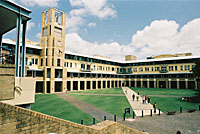| The 60s: Australia and the United States - HIST1015 |
|
|||||||||||||||||||||||||||||||||||||

Description Examines the significance of the 1960s in Australian and American national life and explores the construction of the Sixties as an epoch in western history. After exploring the construction of the Sixties the course will examine a number of significant social and political themes which have characterised the period and compare and contrast the Australian and American experience. Themes include issues such as race and minorities, popular culture, civil protest, architecture, the war in Vietnam, student activism, the sexual revolution and the counter-culture. Concludes by examining the legacy of the Sixties for Australia and the United States.
Learning Outcomes Generic Skills Students will:
History Specific Skills Students will develop skills which will involve:
Assessment
|
||||||||||||||||||||||||||||||||||||||

| Contacts | Library | myUNSW | WebCT |